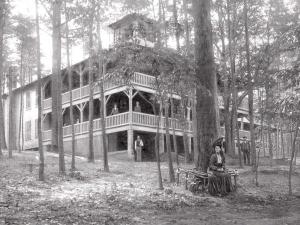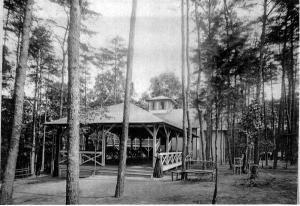
Fabulous Glen Sligo Hotel Spices
Early Takoma History
Taken from a newspaper article in The Takoma Journal,
Special Takoma Park Historical Supplement, Friday, June 30, 1950
Published by permission of Historic Takoma, Inc. 2003
|

|
|
Guests at Glen Sligo Hotel 1901
|
|
It was a sunny afternoon at the turn of the century when he alighted from the Baltimore and Ohio Railroad train at Takoma Park. He was a large man, all of six three foot three, yet he carried himself with the poise and grace of an athlete despite his 50 odd years. His sandy hair and quite handsome face were protected to a degree from the sun by a high silk topper. He wore a well-tailored cutaway coat, striped trousers and a beautifully brocaded double-breasted waistcoat. Across the front of the latter, from the upper right-hand pocket to the lower left, the sunbeams played about a heavy solid gold chain. In his hand, quite casually, he gripped an ebony cane mounted with a solid gold handle.
As he proceeded toward 4th and Butternut Streets, passersby stopped and looked, for this man was not only a stranger in town, but apparently a pretty important one. They did not know then that the man was Alva M. Wiswell, promoter of gold mines, real estate development, oil wells, carnivals; anything, in fact, that could be projected for a profit.
|
Just why this tall, handsome stranger had come to Takoma Park was, of course, not known immediately, but he knew, and that was all that mattered at the moment. Once aboard the Baltimore and Washington Transit Company street car, he went directly to the end of the line, which would be about midway between Elm Avenue and Sligo Creek Parkway, on what is Heather Avenue today.
At his destination, Alva Wiswell wasted no time. He made a personal survey of the woods all the way from Heather Avenue to what is now New Hampshire Avenue and decided that his trip had not been in vain. Here, indeed, was what he sought! He would promote a hotel and summer resort.
|
Necessary backing was obtained, and Wiswell returned to Takoma. The hotel was begun about 1900 and as originally planned was to have eight rooms, a luxurious bar, a huge dance pavilion, and, probably out of deference to his home city, Wiswell also planned and built an enormous bake oven, so that visitors might enjoy the famous baked beans as they were cooked in Boston.
Development plans also called for the construction of a mill race all the way from the mill and mill pond clear down to New Hampshire Ave. An architect was called in from Boston and plans were made for the dredging of the mill race and the construction of numerous canals to form islands, notably Cuba and Puerto Rico, so that those enjoying miniature cruises in the flat-bottomed boats might "tour" the West Indies.
|
Published by permission of Historic Takoma, Inc. 2003
|

|
|
Dance Pavilion at Glen Sligo Hotel
|
|
What happened to Alva M. Wiswell, the Glen Sligo Hotel and the cleverly laid plans for the canals is a little known story, but one, nevertheless, not lacking in interest.
Part of Wiswell's dream came true. The Glen Sligo Hotel was begun and completed in 1900. Its popularity as a resort increased rapidly and, encouraged by the success of the venture thus far, Wiswell dreamed greater dreams.
The first minor setback struck at the canals. The Boston architect's plan for the little West Indies was, in fact, carried through. Shortly after the completion of the project, however, it was treated to one of Takoma Park's famous flash floods, and in practically no time at all both Cuba and Puerto Rico become one and the same in the silt at the bottom of the Anacostia River.
Having sustained this tragedy, Wiswell began anew, only to receive the second and fatal blow. It appears that at least one, or possibly more, of his gold mines collapsed and stockholders were clamoring for their money. They had to be paid, and there was only one source of ready cash - the Glen Sligo Hotel and resort. The property went into receivership and William A. Mellen gained the controlling interest. While negotiations were in progress, word was received that a group of people had heard of the property and were interested in its lease. The bank directed Mellen, forthwith, to take advantage of the offer. He did, and the second chapter in the brief history of the Glen Sligo Hotel was about to be written.
The "interests" proved to be a group of highly-financed gamblers from Baltimore who saw extensive possibilities in the Glen Sligo Hotel premises. With prompt dispatch, they took over, and the property, just as promptly, was no longer a resort in keeping with the original plan of Wiswell.
The place specialized in race track information. It made book, paid off and sought to expand its clientele. It did, and with the new prosperity came a more distinguished group of patrons. They included attaches from the embassies, a smattering of Congressmen, and some race track regulars. Business thrived and telegraph lines were brought in from the nearby Baltimore and Ohio Railroad.
Life went on at a gay pace for about a year. At that end of that time, what happened is not entirely clear, but as near as can be discerned from both eyewitnesses and other data, the end of the Glen Sligo Hotel and resort was just as colorful as its beginning.
Complaints on the part of citizenry led to official action. Sheriff Ben Hardesty, a little over enthusiastically perhaps, but nevertheless determinedly, rounded up a posse of some 15 to 20 gentleman of adventurous nature and armed each one of them with a nickel-plated revolver. This somewhat raucous company proceeded toward the Glen Sligo Hotel in the baking temperature of a mid-July afternoon, in two wagon loads, completely armed with everything in the way of hardware, but lacking the official authority of a warrant.
This was a minor detail which was of little or no concern to either Ben Hardesty or his followers. The raid was on and the devil take the hindmost. The wagons stopped at the bottom of Heather Avenue and belched forth their contents. Raiders swarmed up to the hotel in a manner which would have made Teddy Roosevelt less proud of San Juan.
They burst in the door and entered the main lobby, which looked like a meeting of the United Nations. There were Chinese, Swedes, Polish, Japanese, Irishmen, Englishmen and Slavs, representing just about every embassy on Massachusetts Avenue. The walls were lined with huge blackboards showing the results of every race east of the Mississippi from Florida to Maine. Telegraph tickers continued their merry staccato despite the hush which fell over the lobby.
"I'm closing this joint," said Hardesty, "and everybody here is under arrest."
The irate manager snaked through the crowd of bewildered patrons and demanded to see Hardesty's warrant. There was none.
"It still doesn't make any difference," said Hardesty, "Come on, all of you!"
A few of the weaker and less informed clients piled out of the hotel and into the wagons. They were quickly dispatched to Laurel to await trial. The stronger and more informed resisted and stayed right where they were. When the raiders left, business was resumed as usual.
It was not quite the end. The management, well aware of the fact that an illegal raid had been inflicted upon his premises, sued Ben Hardesty for illegal trespassing, false arrest and several other charges, none of which was ever heard in a courtroom. Two days after he received notice of the suit, Ben Hardesty dropped dead of a heart attack!
Although unsuccessful from a legal standpoint, the raid was, nevertheless, the major development which brought down the final curtain in the Glen Sligo Hotel drama. Continued protest from neighboring residents led Mr. Mellen to deny the Baltimore group a renewal of their lease. They left, and Alva M. Wiswell's dream of a gigantic summer resort project remained only a silent monument to his memory.
In 1903, the Council took over the lease given by the B & W Transit Company and the resort was closed. The tracks were removed some two years later and the right-of-way reverted to the town. In 1920, the hotel was torn down and the property subdivided into individual lots.


